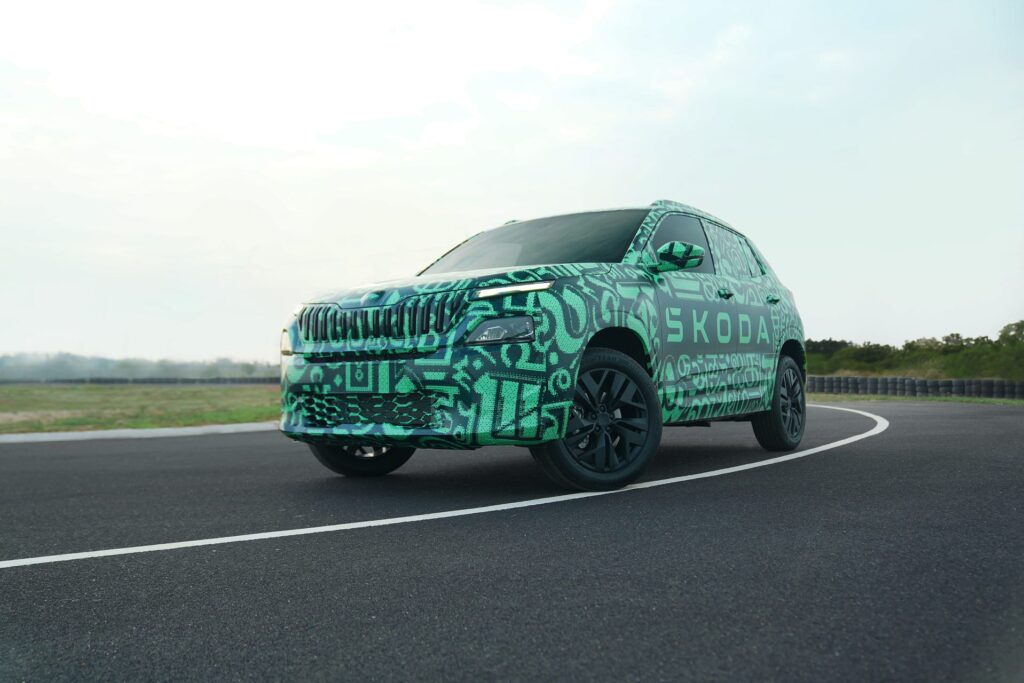The sub-4 metre compact SUV segment is one of the most competitive and fastest-growing in India, and Skoda has thrown its hat into the ring with the upcoming launch of the Kylaq. A highly anticipated model, the Kylaq represents Skoda’s ambition to capture a larger share of this booming market. This compact SUV, which will be smaller than the Skoda Kushaq, is packed with features that aim to set it apart from its rivals.

Skoda Kylaq: The Key Details
Set to launch on November 6, 2024, the Kylaq is poised to become a strong player in the compact SUV market. It measures 3,995 mm in length, placing it comfortably within the sub-4 metre category to take advantage of India’s tax benefits for smaller vehicles. With a wheelbase of 2,566 mm and a ground clearance of 189 mm, it is well-suited for Indian roads, balancing manoeuvrability with robust ground clearance for varied terrain.
Built on the MQB A0 IN platform, which Skoda developed specifically for the Indian market, the Kylaq shares its foundation with the Kushaq and Slavia. This platform is renowned for its flexibility and crash safety, having secured five stars in the Global NCAP crash tests for both adult and child occupant protection. Skoda’s focus on safety continues with the Kylaq, which will come equipped with 25 active and passive safety features, such as six airbags, Electronic Brake Distribution (EBD), traction control, stability control, ISOFIX seats, and Multi Collision Braking.
The engine powering the Kylaq will be the same 1.0-litre TSI turbocharged petrol engine found in the Kushaq, producing 115 hp and 178 Nm of torque. Customers will have the choice between a 6-speed manual transmission or an automatic. The combination of a peppy engine and advanced safety features promises a capable and enjoyable driving experience.
Volkswagen’s Take on the Kylaq: The Compact SUV of 2026
While Skoda is gearing up for the Kylaq’s launch, Volkswagen is preparing to enter the same segment with a compact SUV of its own in 2026. Interestingly, this SUV will essentially be a rebranded version of the Skoda Kylaq, sharing the same platform and powertrain. However, Volkswagen will distinguish its model with design changes to align with its brand’s aesthetic.
Volkswagen’s decision to launch a compact SUV comes as a strategic shift. Initially, the brand was reluctant to dive into this category due to its past struggles with models like the Ameo, which failed to capture the market despite heavy investment. However, changing market dynamics and the realisation that the transition to electric vehicles (EVs) will take longer than expected prompted VW to reconsider its stance. The sub-4 meter segment now offers an opportunity for Volkswagen to expand its footprint in India.
Volkswagen’s version of the Kylaq will likely feature the same 1.0-litre engine but may also offer a special 1.5-litre ‘GT’ version for enthusiasts seeking higher performance. With subtle tweaks in exterior design, such as a new grille, bumpers, and lighting, VW aims to differentiate its offering while keeping development costs in check. The German automaker expects to spend around 25 million euros to bring its compact SUV to market, a relatively modest sum compared to Skoda’s investment.
The Competitive Landscape
The sub-4 meter SUV segment is incredibly crowded, with competitors like the Hyundai Venue, Tata Nexon, Maruti Suzuki Brezza, and Kia Sonet vying for attention. For both Skoda and Volkswagen, cracking this segment will be a challenge, but they are betting big on their respective models. Skoda has set an ambitious target of selling 100,000 units of the Kylaq in its first year, banking on the vehicle’s competitive pricing (expected to be between ₹8-12 lakh) and extensive safety features to draw in customers.
Volkswagen, on the other hand, faces a steeper climb as it enters the market later. However, with its strong brand reputation and potential to attract performance enthusiasts through a GT variant, VW could carve out a niche for itself within the segment.
Conclusion: The Road Ahead
Skoda’s Kylaq and Volkswagen’s upcoming compact SUV are set to make waves in India’s sub-4 meter SUV market. The Kylaq’s combination of safety, performance, and practicality seems well-tailored for Indian consumers, while Volkswagen’s version will offer a slightly different flavour of the same formula. With both brands leveraging the same platform and powertrain, the key to success will lie in execution, pricing, and how well each model resonates with India’s SUV-loving consumers. As the competition heats up, it will be interesting to see how these two vehicles perform in one of the most critical segments of the Indian auto market.





